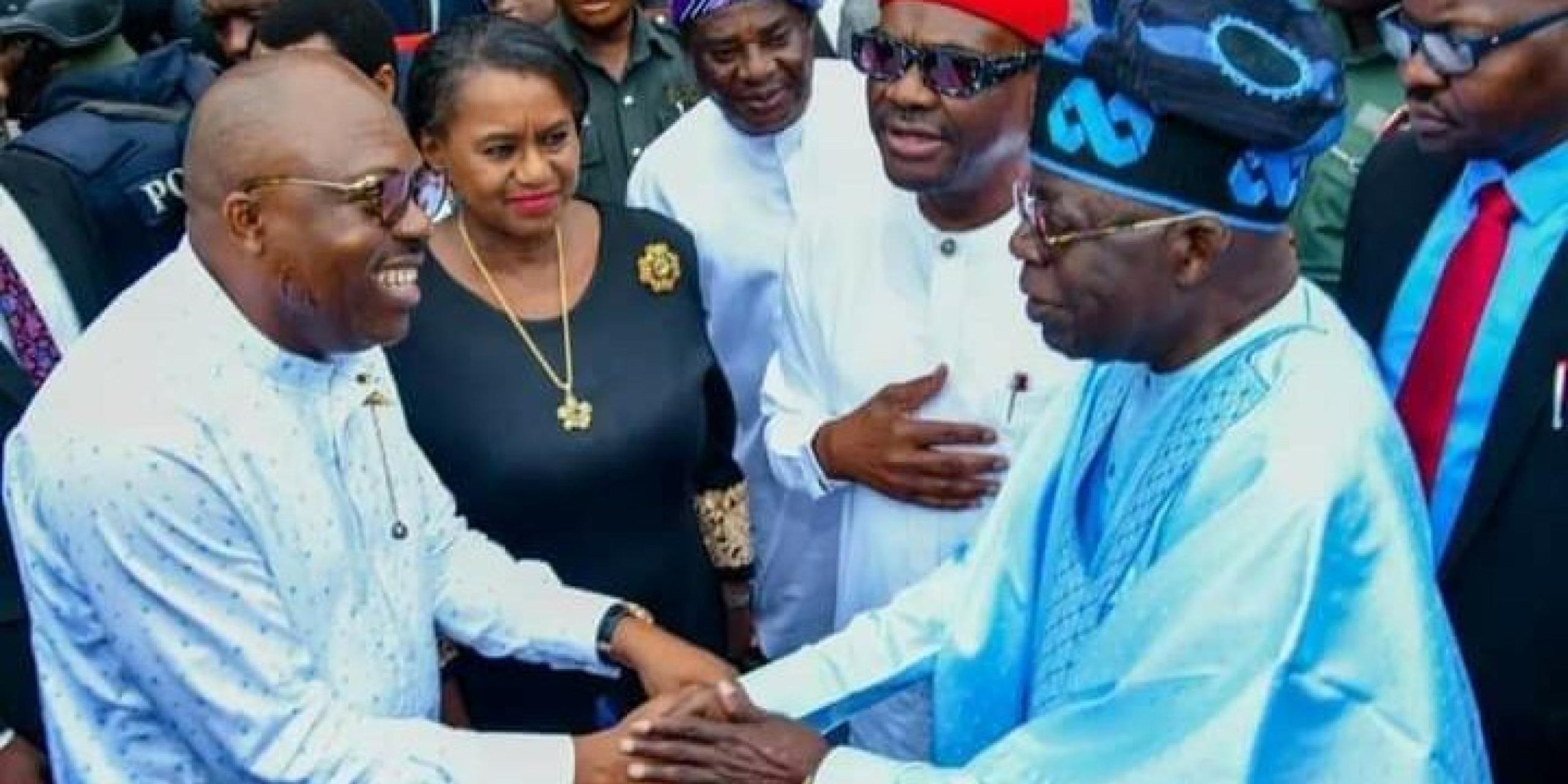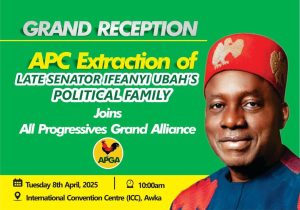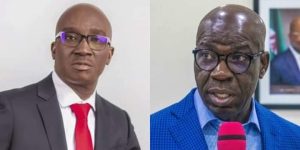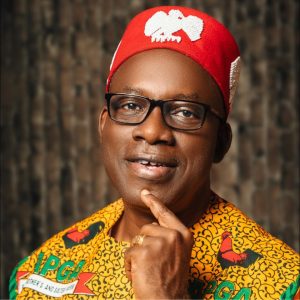EXCLUSIVE REPORT: Suspended Rivers Governor Fubara Set to Join APC After Secret Deal With Tinubu Amid Political Pressure Ahead of 2027 Elections
In a major political realignment poised to alter Nigeria’s 2027 electoral landscape, multiple sources have revealed that the suspended Governor of Rivers State, Siminalayi Fubara, is on the verge of formally defecting to the ruling All Progressives Congress (APC) following a high-level political agreement brokered with President Bola Ahmed Tinubu.
This development, while not yet confirmed through official government communication, is understood to be the product of a months-long strategy by the APC-led Federal Government to systematically dismantle strongholds of opposition across Nigeria. Analysts believe the campaign is designed to weaken resistance, consolidate national control, and ensure a less-contested path to President Tinubu’s re-election bid.
The saga surrounding Fubara’s ordeal is one steeped in betrayal, political warfare, and the use of federal might to neutralize a sitting governor who once enjoyed considerable local popularity and legitimacy. But under the weight of coordinated institutional pressures and a deepening rift with his former political mentor, the Governor has allegedly been left with little choice.
Insiders familiar with the arrangement describe Fubara’s decision as a reluctant but necessary concession to retain any meaningful political relevance. According to them, what has played out in Rivers State over the last year is not merely a local power tussle but part of a grander scheme involving the highest levels of Nigeria’s power hierarchy.
Since taking office in May 2023, Governor Fubara’s tenure has been rocked by internal conflict. His once-strong alliance with former governor and current Minister of the Federal Capital Territory, Nyesom Wike, disintegrated into open hostility shortly after his inauguration. The falling out triggered a political war that quickly spiraled into a full-blown constitutional crisis.
Fubara’s woes deepened as the Presidency aligned with Wike, granting him federal backing to undermine his estranged protégé. Legislative attempts to impeach Fubara were pursued with ferocity, aided by judicial orders and threats, reportedly orchestrated with input from powerful individuals in Abuja.
Simultaneously, civil institutions in Rivers became increasingly polarized. Several commissioners loyal to Wike resigned from Fubara’s cabinet, while pro-Wike lawmakers in the State House of Assembly persistently challenged the legitimacy of Fubara’s administration. The situation escalated when rival legislative factions began holding parallel sittings, sometimes under police protection, to pass conflicting resolutions.
By early 2025, governance in Rivers State had become almost impossible. The paralysis set the stage for one of the most controversial moves in Nigeria’s recent democratic history.
YOU MAY READ
The Genesis of the Crisis Between Governor Sim Fubara & FCT Minister Nyesom Wike
On March 18, 2025, President Tinubu invoked emergency powers under Section 305 of the 1999 Constitution (as amended), declaring a state of emergency in Rivers State. He cited a breakdown of law and order and an irreconcilable governance crisis as justification. The move, which was quickly ratified by the National Assembly, led to the suspension of Fubara and his deputy, Ngozi Odu. Simultaneously, the President dissolved both the executive and legislative arms of the state government.
In their place, Tinubu appointed retired Vice Admiral Ibok-Ete Ekwe Ibas as sole administrator of Rivers State. The retired naval chief, known to be loyal to the Presidency, assumed full control of the state’s governance, backed by the police and military forces deployed to strategic government facilities in Port Harcourt.
This controversial intervention sparked an uproar nationwide. Civil society organizations, opposition parties, and constitutional experts condemned it as an authoritarian overreach and a calculated move to silence dissent. Many warned that Nigeria’s democracy was being eroded under the guise of law and order.
However, despite growing criticism, the state of emergency remained firmly in place. For many observers, the measure was less about resolving a local crisis and more about enforcing political discipline ahead of 2027.
With public sympathy gradually shifting towards the embattled Governor, the Presidency initiated a new phase of its plan: secret reconciliation talks aimed at forcing a compromise. Sources say that Fubara’s defection plan was sealed during a discreet meeting with President Tinubu in London in April 2025, widely referred to by insiders as the “London Peace Accord.”
Although the Presidency never publicly acknowledged the meeting, reports from credible diplomatic circles confirm it took place. It marked the first face-to-face engagement between the President and Fubara since the crisis began. During the session, Tinubu allegedly offered Fubara a deal: defection to the APC in exchange for his reinstatement and political survival.
According to insiders, Fubara, facing political extinction, reluctantly agreed. The terms of the deal reportedly include limited autonomy over Rivers State resources, increased federal oversight, and a power-sharing arrangement with Abuja-aligned stakeholders. The same Wike who spearheaded Fubara’s political decimation has also been asked to soften his stance, publicly rebranding their feud as a family misunderstanding.
In a recent media interview, Wike appeared to backtrack on his previous antagonism toward Fubara, referring to him as “my son.” He insisted that he was never at war with Fubara but was merely fighting those “pushing him” from behind. This public reconciliation is viewed by critics as a carefully choreographed act to pave the way for Fubara’s reintroduction into political life under APC colors.
Many Nigerians, particularly in Rivers State, are struggling to reconcile this turnaround with the months of political torment the Governor endured. Political analysts see it as a complete capitulation, arguing that the federal government’s strategy of subduing Fubara through institutional warfare has effectively succeeded.
What’s more troubling for critics is the precedent this saga sets for the future of Nigeria’s democracy. For many, the abuse of state power to crush dissent and enforce party loyalty represents a return to the dark days of military-style governance dressed in civilian garb.
The opposition Peoples Democratic Party (PDP), of which Fubara was a member, has remained largely silent, with internal divisions and defections weakening its ability to respond. Several PDP governors are reportedly wary of speaking out, fearing similar treatment in their states. Others are said to be in negotiations to switch sides before 2027, a testament to the effectiveness of Tinubu’s divide-and-rule strategy.
Observers point to the use of the National Assembly, the judiciary, and federal security agencies as tools in a wider political chess game designed to entrench one-party dominance. They warn that if unchecked, such maneuvers could destroy the fragile balance of Nigeria’s federal democracy and entrench authoritarianism.
Meanwhile, the people of Rivers State are left to grapple with the consequences. The emergency rule has stifled development projects, disrupted government services, and created an atmosphere of fear and uncertainty. The anticipated return of Fubara under a new political banner is unlikely to assuage these concerns, especially if it means the continuation of federal tutelage over state affairs.
As 2027 draws nearer, the events in Rivers are being closely watched by both national and international observers. For many, it is not just about the fate of one governor but a harbinger of what could unfold in other states where opposition parties hold sway.
The coming months will reveal whether Governor Fubara’s defection to the APC results in political peace or further conflict. Regardless, the saga has already exposed the fragility of Nigeria’s democratic institutions, the ruthlessness of its politics, and the extent to which power is willing to go to sustain itself.
The Governor’s anticipated declaration of allegiance to the APC, expected in a highly publicized ceremony in Port Harcourt, will likely mark the official end of his ordeal—but also the beginning of a new chapter defined by political compromise and strategic subservience.
For now, the people of Rivers State, and indeed Nigerians at large, are left with lingering questions. What does this mean for federalism? How much longer will political loyalty outweigh electoral mandate? And at what point will the electorate reclaim the democratic space now dominated by power blocs, emergency decrees, and backroom deals?
Until these questions are answered, the Rivers drama will remain a cautionary tale of how political ambition, betrayal, and state power can be weaponized to redraw Nigeria’s political map—one reluctant defector at a time.
EXCLUSIVE: Suspended Rivers Gov Fubara To Join APC After Tinubu Deal, Political Intimidation In Bid To Crush Opposition Before 2027 Polls
This development, sources say, is the culmination of a calculated campaign by the APC-led Federal Government to weaken opposition strongholds across the country ahead of the next general elections.
In a major political twist that could reshape the 2027 electoral landscape, exclusive information obtained by SaharaReporters reveals that President Bola Ahmed Tinubu has finally coerced Rivers State Governor, Siminalayi Fubara, into joining the ruling All Progressives Congress (APC), following months of intense political pressure, institutional intimidation, and strategic coercionThis development, sources say, is the culmination of a calculated campaign by the APC-led Federal Government to weaken opposition strongholds across the country ahead of the next general elections.
According to sources, the objective is to consolidate power, neutralise political threats, and ensure that President Tinubu coasts to victory in 2027 with minimal resistance.
Multiple sources familiar with the situation describe the pressure mounted on Governor Fubara as “unprecedented and deeply troubling” in Nigeria’s democratic history.Travel guides
The Federal Government, allegedly using every state apparatus—from the judiciary and security agencies to the National Assembly—launched a coordinated offensive aimed at undermining Fubara’s authority and isolating him politically, until he had no viable option but to capitulate.
At the centre of this political storm is Minister of the Federal Capital Territory (FCT), Nyesom Wike, Fubara’s political godfather-turned-adversary.
With federal backing, Wike spearheaded a relentless campaign to bring Fubara to his knees. From orchestrated legislative threats to judicial manoeuvers and threats of impeachment, Wike was said to be acting with the full blessing of the Presidency.
“The President wanted Rivers State under control by any means necessary,” one source disclosed. “The fear of 2027 is real. Their internal assessments showed that public discontent was growing over hardship, insecurity, and economic mismanagement. The only way out was to break the opposition and enforce loyalty, state by state.”
This explains why, according to political observers, the Presidency turned a deaf ear to the outcry from prominent Nigerians and civil society groups who condemned the sustained political siege on Governor Fubara.
Sources say the turning point came during the controversial “2025 London Peace Accord,” a high-level secret negotiation between Fubara and Tinubu.
“It was during this meeting that Governor Fubara agreed to join the APC in exchange for political survival,” one of the sources said.
In April, during a working visit to London, President Bola Tinubu met with suspended Rivers State Governor Siminalayi Fubara.
The meeting, confirmed by The Africa Report, has not been officially acknowledged by the Presidency.
According to officials, it marked the first face-to-face encounter between Tinubu and Fubara since the President declared a state of emergency in Rivers State and removed Governor Fubara and his deputy, Ngozi Odu, from office.
As part of the terms, the embattled Governor would be reinstated—albeit under strict conditions—with control of Rivers State’s resources now shared or closely monitored by the ruling party’s power brokers. The same Wike who publicly derided and sought Fubara’s removal is now singing a different tune, recently describing the Governor as “his son” and denying ever fighting him.
In a recent interview with BBC Pidgin, Wike denied fighting with the suspended Rivers State governor, saying, “Fubara is my son, why will I fight with him?
“I’m only fighting against people who want to steal what they did not work for.
“When you don’t defeat them, they will think you….. Defeat them to the final stage.
“Now, they are ashamed because they are being defeated. They are the ones pushing Fubara.”
According to the publication, Wike noted that he had told Fubara during a visit that he was ready for peace — if Fubara was ready as well.
“I told him that you have yam in your hand and the knife, you are the one that knows how you want peace. If you want sincere peace, you take, if you want dubious peace, you also take.”
This abrupt political U-turn has left many Nigerians disillusioned.
“Fubara has been beaten into submission, and Rivers State has been turned into a pawn in the power game of Abuja,” one of the sources said.
“No governor has ever suffered such humiliation as Governor Fubara suffered in the history of Nigerian politics.”Travel guides
The source lamented how Fubara, a governor, was “humiliated, tormented, and politically crushed” to force him into the ruling party.
No governor has been subjected to such abuse of power in Nigeria’s history,” the source said.
How Tinubu Declared Emergency Rule in Rivers State
On March 18, 2025, President Tinubu invoked Section 305 of the 1999 Constitution (as amended) to declare a state of emergency in Rivers State, citing a breakdown of law and order and the failure of constitutional mechanisms to resolve the escalating political crisis in the state.
Travel guides
The declaration followed months of intense political turmoil between Fubara and his estranged political godfather, Wike.
The conflict, which began shortly after Fubara assumed office in May 2023, led to repeated attempts by a faction of the state House of Assembly to impeach the governor, violent protests, destruction of government property, and a governance vacuum in the state executive council.
Citing the state government’s inability to maintain public order and coordinate essential governance functions, President Tinubu also secured a controversial National Assembly approval for the emergency declaration as required by the Constitution.
He stated that the crisis in Rivers had become a national security concern with implications for democratic stability.
Following the proclamation, Governor Fubara and his deputy, Ngozi Odu, were suspended from office, along with key state officials, and the state’s executive and legislative functions were dissolved.
The President then appointed a sole administrator, retired Vice Admiral Ibok-Ete Ekwe Ibas, believed to be loyal to the Presidency, to take charge of governance in the state during the emergency period.
The move was widely condemned by opposition parties, civil society groups, and constitutional scholars, who argued that the declaration was politically motivated and violated democratic norms.
Critics accused the Tinubu administration of using federal power to suppress dissent and consolidate control over opposition strongholds ahead of the 2027 general elections.
Despite public outcry, the state of emergency remained in effect, and federal security forces took over key government institutions in Port Harcourt, further deepening fears of a creeping authoritarianism under the guise of constitutional emergency powers.
CREDIT: Sahara Reporters





